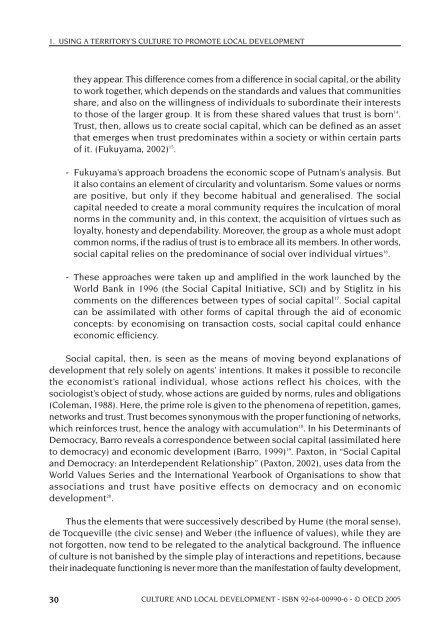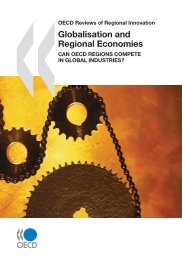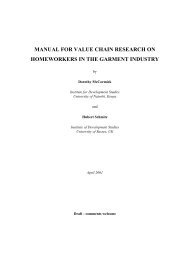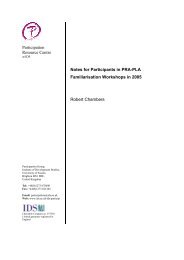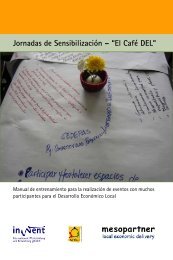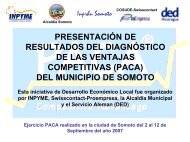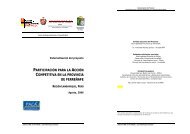OECD Culture and Local Development.pdf - PACA
OECD Culture and Local Development.pdf - PACA
OECD Culture and Local Development.pdf - PACA
Create successful ePaper yourself
Turn your PDF publications into a flip-book with our unique Google optimized e-Paper software.
1. USING A TERRITORY’S CULTURE TO PROMOTE LOCAL DEVELOPMENT<br />
they appear. This difference comes from a difference in social capital, or the ability<br />
to work together, which depends on the st<strong>and</strong>ards <strong>and</strong> values that communities<br />
share, <strong>and</strong> also on the willingness of individuals to subordinate their interests<br />
to those of the larger group. It is from these shared values that trust is born 14 .<br />
Trust, then, allows us to create social capital, which can be defined as an asset<br />
that emerges when trust predominates within a society or within certain parts<br />
of it. (Fukuyama, 2002) 15 .<br />
- Fukuyama’s approach broadens the economic scope of Putnam’s analysis. But<br />
it also contains an element of circularity <strong>and</strong> voluntarism. Some values or norms<br />
are positive, but only if they become habitual <strong>and</strong> generalised. The social<br />
capital needed to create a moral community requires the inculcation of moral<br />
norms in the community <strong>and</strong>, in this context, the acquisition of virtues such as<br />
loyalty, honesty <strong>and</strong> dependability. Moreover, the group as a whole must adopt<br />
common norms, if the radius of trust is to embrace all its members. In other words,<br />
social capital relies on the predominance of social over individual virtues 16 .<br />
- These approaches were taken up <strong>and</strong> amplified in the work launched by the<br />
World Bank in 1996 (the Social Capital Initiative, SCI) <strong>and</strong> by Stiglitz in his<br />
comments on the differences between types of social capital 17 . Social capital<br />
can be assimilated with other forms of capital through the aid of economic<br />
concepts: by economising on transaction costs, social capital could enhance<br />
economic efficiency.<br />
Social capital, then, is seen as the means of moving beyond explanations of<br />
development that rely solely on agents’ intentions. It makes it possible to reconcile<br />
the economist’s rational individual, whose actions reflect his choices, with the<br />
sociologist’s object of study, whose actions are guided by norms, rules <strong>and</strong> obligations<br />
(Coleman, 1988). Here, the prime role is given to the phenomena of repetition, games,<br />
networks <strong>and</strong> trust. Trust becomes synonymous with the proper functioning of networks,<br />
which reinforces trust, hence the analogy with accumulation 18 . In his Determinants of<br />
Democracy, Barro reveals a correspondence between social capital (assimilated here<br />
to democracy) <strong>and</strong> economic development (Barro, 1999) 19 . Paxton, in “Social Capital<br />
<strong>and</strong> Democracy: an Interdependent Relationship” (Paxton, 2002), uses data from the<br />
World Values Series <strong>and</strong> the International Yearbook of Organisations to show that<br />
associations <strong>and</strong> trust have positive effects on democracy <strong>and</strong> on economic<br />
development 20 .<br />
Thus the elements that were successively described by Hume (the moral sense),<br />
de Tocqueville (the civic sense) <strong>and</strong> Weber (the influence of values), while they are<br />
not forgotten, now tend to be relegated to the analytical background. The influence<br />
of culture is not banished by the simple play of interactions <strong>and</strong> repetitions, because<br />
their inadequate functioning is never more than the manifestation of faulty development,<br />
30 CULTURE AND LOCAL DEVELOPMENT - ISBN 92-64-00990-6 - © <strong>OECD</strong> 2005


